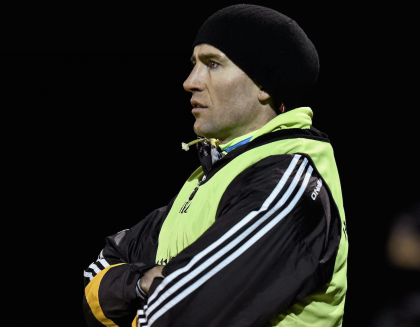
LEADING THE LINE…Eddie Brennan, rather than Brian Cody, has been managing Kilkenny in January
IS it just me, or is it more than a little ironic that a county manager who chose to field an u-21 side in a senior inter-county preseason competition then complained about the number of games that 19 and 20-year-olds have to play at this time of year?
Former Kilkenny star and current u-21 manager Eddie Brennan this week voiced the opinion that pre-season competitions, specifically the Walsh Cup, have run their course.
His reasoning was that the Kilkenny players who have been lining out for the Cats in the Walsh Cup have been getting “far too much hurling”. It’s a different take on things to say the least. Most players will complain that the training to games ratio in county hurling needs to go the other way.
“I have won a few Walsh Cups and it’s a great way to test a few lads and see what’s in their bellies,” said the eight-time All-Ireland winner. “But I certainly believe the Walsh Cup, an inter-county competition at this time of the year, has run its course. I don’t think there’s anything to be gained from it.
“There is a lot going on in the season and maybe leave this time of year free for the third level colleges and then get into the league. I think we’re seeing a lot more county teams getting more benefit from gym work and running.
“I was aware of the demands put on guys who are 19 to 21 and this year has definitely opened up my eyes even further between colleges and freshers. You’re getting a feel for what fellas are doing regards freshers programmes and some of it is just off-the-wall. There is far too much hurling.
“If it is something that’s debated and in the best interests of the players, there is merit in reducing the number of games for players between the ages of 18 and 21.”
Let me offer a simple solution, Eddie. If you have concerns that there is an overload of games for 19 to 20 year olds in January, then don’t enter the Kilkenny u-21s as a team in the Walsh Cup. Straight away you’ll find that you’ve cut the game time by at least 210 minutes. In fact, you’ll find that most county teams allow students to play with the colleges throughout the pre-season and take the opportunity to look at other players.
Another issue that is raised by Brennan’s comments is whether a breach of the rule on collective u-21 training has been breached. Without a hint of irony, Brennan asked: “A lot of teams are coming back at this stage with two or three months training done when there’s supposed to be a ban. What’s being done to enforce that?
“Management teams bringing teams back training at the end of October, beginning of November need to have a look at themselves.”
For Kilkenny’s three Walsh Cup games, Brennan has been running the Kilkenny line instead of Brian Cody. Brennan is the u-21 manager and, apart from one or two senior players, the Cats’s quad for the Walsh Cup is the de facto 2016 Kilkenny u-21 squad.
The rule states that u-21 hurling panels should not begin collective training before the completion of the Fitzgibbon Cup, the final of which is on February 27th.
There’s a debate to be had on whether Brennan is actually training his u-21 squad whilst fielding them in the Walsh Cup, but even if it doesn’t constitute ‘training’ or indeed if he is merely bringing the players together for Walsh Cup matches, it’s hardly in the spirit of the rule that was brought in to mitigate against burn-out and the bottleneck of games that Brennan is complaining about – yet contributing to – by playing the u-21s in the first place.
In the wider context of preseason tournaments, most managers I’ve spoken to regard them as a bit of a welcome evil. There’s perhaps not that much you get out of them from a hurling point of view, given the conditions at the time of year, but they provide a vehicle to look at new players, to improve fitness, teamwork, team spirit etc, and if they didn’t exist, managers would be trying to arrange challenge games in the run-up to the start of the league.
Fixture reform has been focussed on football lately, with recommendations to ensure that a footballer’s year doesn’t end too prematurely by the introduction of a ‘B’ championship.
The pre-season conundrum is a small element of the wider fixtures debate. At one end of the scale, you have a Kilkenny side that plays its first championship game towards the end of June and completes a winning MacCarthy Cup campaign by playing the grand total of four games, and at the other you have Laois who started their 2015 in early May, played five games, and were out of the championship before Kilkenny had pucked a ball.
But there’s a greater injustice further down the pecking order where, for most counties, the entire season is over by May, and the next county game is over seven months later in February of the following year, meaning the best hurling months of the year are a wasteland. Brennan this week complained of “too much hurling”. Those are words that never have or never will be spoken in probably 24 or 25 counties.
Comment@gaeliclife.com
Receive quality journalism wherever you are, on any device. Keep up to date from the comfort of your own home with a digital subscription.
Any time | Any place | Anywhere











